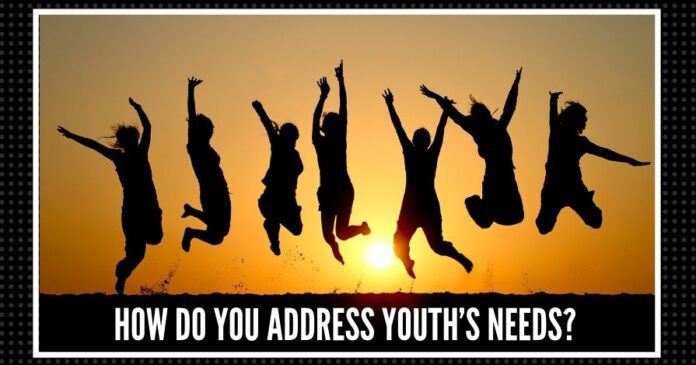
For a social/political worker, it is important to strike a balance between delivering what the youth want and what they need
The problems affecting the youth are rising uncertainty over their future, lacking or seeking a sense of identity, rising inequality among groups and global environmental issues. Responses to the first three issues often manifest in regionalism or parochialism and this is true not only in international but also in our national context. Brexit and election of Trump are major examples in the international sphere. What is happening in Assam and North East and very recent incidents in Gujarat are examples in our national space.
The War on Poverty is not a struggle simply to support people. It is an effort to allow them to develop and use their capacities.
Further, verbal violence has now become an essential part of political discourse. It preys on fears and insecurities and leads to voters disregarding real issues. It involves designating so-called enemies, thus inciting individuals to think only passionately and not according to their rational individual conscience.
Often, our desire for what we want is much greater than the desire for what we need. The want is usually impulsive, volatile and selfish, but the need is usually low profile and remains underneath and concealed. The want is usually a short-term fix, while the need is often deep-rooted and difficult to deal with. For a social/political worker, it is important to strike a balance between delivering what the young people want and what they need. If the project can deliver both of these, then it will be successful in many ways. But, often times people focus primarily on what they want, rather than what they need. Therefore, a clear understanding of this difference is a must.
The War on Poverty is not a struggle simply to support people. It is an effort to allow them to develop and use their capacities. We have a thriving system of parliamentary democracy, the largest in the world and a tried and tested system of parliament and assembly elections. This has been extended up to municipal and panchayat elections and has led to empowerment on a large scale particularly for women, underprivileged and poorer sections of people. There is now more and more participation from the grass-root level in the governance process. But for their meaningful participation towards reducing conflicts and sufferings, and motivating the needy, there has to be immersive, interactive and experiential understanding of their requirements. This involves social and emotional learning on the part of social and political workers. Empathy and compassion training are the key competencies for them
The solution for all problems ultimately lies in the hands of the people only. People should gain proper knowledge and develop a better understanding of the problems
Empathy is a gateway to compassion. It is understanding how someone feels under a given situation, and trying to imagine how that might feel for us — it’s a mode of relating. Compassion takes it further. It is feeling what a person is feeling, holding it, accepting it, and taking some kind of positive action. Empathy plants the seeds of compassion, and under its stimulus, we can find ourselves acting in compassionate ways that never would have occurred to us before.
Education is the main key to raising human capital. There are many organisations who deal with the problem of Juvenile delinquency. They are established to help those children who are involved in it. There are rehabilitation centres and consultancies also run by the Government who treat the juvenile delinquents. All of them, the workers in the organizations, need to have empathy and compassion training.
The solution for all problems ultimately lies in the hands of the people only. People should gain proper knowledge and develop a better understanding of the problems. By removing the negative thoughts, one can correctly judge what’s right or wrong. It is really about putting oneself in the shoes of the other and understanding the other’s emotions from their own perspective and this is what is expected from political and social workers.
Note:
1. The views expressed here are those of the author and do not necessarily represent or reflect the views of PGurus.
- The real Parivartan is to be ushered in now. - March 23, 2021
- When will the truth dawn on Bengalis? - March 13, 2021
- The many arguments of anti-Modi intellectuals - November 5, 2020











One of the reasons there is uncertainty about the future is that the country has a huge and young population. Population control is just not discussed or promoted.
I have spoken to so many villagers and many still have 4 -5 children. The message of hum do, humare do has not filtered down to the village level, and to certain communities. Ask your cook/cleaner /maid how many siblings she has.
There is a real need not just for a Population Control Bill, but also to implement it.
The real situation, I am afraid, is rather scary, with a total absence of any moral standards or the traditional Indian (or, human) value system in the society, t is not possible to stereotype the solution in this context, having regard to the determinants of life in the present world: VIZ., pursuit of SUCCESS, i.e., money, power and physical pleasures/comforts of all types at any cost. This is all that is taught in our society right from the childhood days–success at any cost! Look at the present generation of unisex parents, running after money and pleasures all day and night and leaving the children also to the dangers of that lifestyle, devoid of any morality whatsoever. Exhausted and drunk, most of them with no idea (or hardly bothered) about the traditional Indian way of life, these parents are producing only human robots with attachment only to their pleasures.
In this context, it must be examined if the Hindu organisations ostensibly run inter alia for the moral upliftment of the Hindus (AND NOT FOR PROVIDING SUPPORT TO THE RAPIST FAKE BABAS SITTING ON UNTAXED ENORMOUS INCOME/WEALTH EARNED BY WAY OF THE PERMISSIVE SYSTEM OF UNJUST ENRICHMENT) have anything to learn from the early Christian Missionaries and their present successors in respect of so called service to the people in the form of running dispensaries, hospitals, orphanages, schools.colleges offering high quality and almost free education, all meant and ultimately used for converting the greedy Hindus to Christianity!
Has there been any single institution established by the VHP (with their huge funds) or other NGOs run by Hindu organisations trying to establish schools/colleges/universities of world standard to impart free or cheap education, super speciality hospitals with free or cheap access to healthcare (for all, irrespective of the Faith of the people), free but comfortable and saFE hostels for girls/women, hostels for those coming from the lower income groups, etc., in all these decades of fractured and communally granted independence?
Why, for instance, there is a craze even among the economically lowest level in our country, there is a mad craze for peons, drivers, etc., to get their wards admitted to the Missionaries run schools or English medium schools? Why the Hindu organisations, just for rendering social service (“service to man is service to God”:Swami Vivekananda), cannot emulate the Christian (and now the Muslim institutions too) Missionaries barring their religious fanaticism and programme for conversion with the allurement of worldly pleasures and success?
If these aspects are taken into consideration inter alia by the secular bureaucrats, all steeped Western Education and lifestyle/mindset, culture and value patterns, and the provisions of the INCOME TAX Act are suitably amended/expanded to give fillip to the tax free donations for establishment and running of thousands of educational institutions, hostels, hospitals of high order, without being communal in any respect, we can still hope to survive as a society.
In this context I would like to mention that, though a staunch Hindu, I do not believe that a temple alone represents the existence of religiosity in Hindus. I had long ago suggested that, instead of building a Ram Mandir in Ayodhya, we should rather try to build a super speciality hospital with state-of-the-art facilities for best healthcare and research meant for all and name this real “temple” after Shri Ram. This invited unthinkable insults from the so called Hindu leaders calling me a pro-Muslim man!But, I still sincerely feel, that by naming this as the Shri Ram Temple Hospital in honour of the great Avatar, we would only perform our best pujas for him every moment of the existence of the hospital.
Coupled with this, the Hindu organisations can seriously think of expanding the employment opportunities for the directionless youth from the poorer classes who have no future in the existing uncertain scenario. Let India’s youth of all Faiths find a future in their life.
Let us try to ensure that the youth is carefully handled and guided–instead of allowing them to dissipate their energies and all the time dreaming of settling abroad for greener pastures.
What I mean is, instead of totally ignoring the needy–irrespective of religion, etc., let the Hindu organisations delve into service to mankind for sometime to return to building of temples later. Morality and Faith in the divinity are of supreme need of the other for the society.
Congratulations to this timely, thought provoking and well-written article.